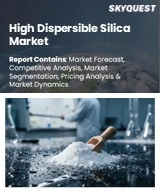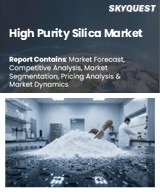
|
시장보고서
상품코드
1748840
실리카 시장 : 산업규모, 점유율, 동향, 기회, 예측, 판매 채널별, 최종 용도별, 지역별, 경쟁별(2020-2030년)Silica Market - Global Industry Size, Share, Trends, Opportunity, and Forecast, Segmented By Sales Channel, By End Use, By Region and Competition, 2020-2030F |
||||||
세계의 실리카 시장은 2024년에는 1,241억 1,630만 달러로 평가되었고, 2030년에는 1,862억 1,987만 달러에 이를 것으로 예측되며, 예측 기간 중의 CAGR은 5.52%를 나타낼 전망입니다.
실리카는 주로 이산화규소(SiO₂)로 구성되며, 석영, 융합 실리카, 실리카 겔, 침전 실리카 등 다양한 형태로 사용됩니다. 건설, 자동차, 전자, 코팅, 개인 위생, 석유 및 가스 등 다양한 산업 분야에서 핵심적인 역할을 수행합니다. 콘크리트, 시멘트, 유리 제조에 널리 적용되는 것이 수요를 촉진하고 있으며, 특히 인프라 개발이 활발한 신흥 시장에서 수요가 증가하고 있습니다. 그러나 결정질 실리카 분진과 관련된 환경 및 직업 건강 규제로 인해 보호 기술에 대한 투자 필요성이 제기되고 있습니다. 또한 실리카 모래와 쿼츠와 같은 원자재의 공급량과 비용 변동은 공급망 전반의 운영 안정성과 가격에 영향을 미칠 수 있습니다.
| 시장 개요 | |
|---|---|
| 예측 기간 | 2026-2030년 |
| 시장 규모(2024년) | 1,241억 1,630만 달러 |
| 시장 규모(2030년) | 1,862억 1,987만 달러 |
| CAGR(2025-2030년) | 5.52% |
| 급성장 부문 | 직접 |
| 최대 시장 | 북미 |
시장 성장 촉진요인
유리 산업에서 실리카 수요 증가
주요 시장 과제
원료 공급의 변동성
주요 시장 동향
타이어 제조에 실리카의 사용 증가
목차
제1장 개요
제2장 조사 방법
제3장 주요 요약
제4장 COVID-19가 세계의 실리카 시장에 미치는 영향
제5장 세계의 실리카 시장 전망
- 시장 규모와 예측
- 금액별
- 시장 점유율 및 예측
- 판매 채널별(직접, 간접)
- 최종 용도별(유리 제조, 주조, 석유 및 가스, 충전재 및 건축 제품, 세라믹, 화학 약품, 기타)
- 지역별
- 기업별(2024년)
- 시장 맵
제6장 북미의 실리카 시장 전망
- 시장 규모와 예측
- 시장 점유율 및 예측
- 북미 : 국가별 분석
- 미국
- 멕시코
- 캐나다
제7장 유럽의 실리카 시장 전망
- 시장 규모와 예측
- 시장 점유율 및 예측
- 유럽 : 국가별 분석
- 프랑스
- 독일
- 영국
- 이탈리아
- 스페인
제8장 아시아태평양의 실리카 시장 전망
- 시장 규모와 예측
- 시장 점유율 및 예측
- 아시아태평양 : 국가별 분석
- 중국
- 인도
- 한국
- 일본
- 호주
제9장 남미의 실리카 시장 전망
- 시장 규모와 예측
- 시장 점유율 및 예측
- 남미 : 국가별 분석
- 브라질
- 아르헨티나
- 콜롬비아
제10장 중동 및 아프리카의 실리카 시장 전망
- 시장 규모와 예측
- 시장 점유율 및 예측
- 중동 및 아프리카 : 국가별 분석
- 남아프리카
- 사우디아라비아
- 아랍에미리트(UAE)
제11장 시장 역학
- 성장 촉진요인
- 과제
제12장 시장 동향과 발전
- 합병과 인수
- 제품 출시
- 최근 동향
제13장 혼란 : 분쟁, 유행, 무역 장벽
제14장 세계의 실리카 시장 : SWOT 분석
제15장 Porter's Five Forces 분석
- 업계 내 경쟁
- 신규 진입의 가능성
- 공급자의 힘
- 고객의 힘
- 대체품의 위협
제16장 경쟁 구도
- Evonik Industries AG
- PPG Industries, Inc.
- Wacker Chemie AG
- AkzoNobel NV
- Tosoh Corporation
- Cabot Corporation
- Solvay SA
- Oriental Silicas Corporation
- Nissan Chemical Corporation
- Kemira Oyj
제17장 전략적 제안
제18장 기업 소개 및 면책사항
HBR 25.06.24The Global Silica Market was valued at USD 124,116.30 million in 2024 and is projected to reach USD 186,219.87 million by 2030, growing at a CAGR of 5.52% during the forecast period. Silica, primarily silicon dioxide (SiO2), is used in various forms such as quartz, fused silica, silica gel, and precipitated silica, and plays a critical role across diverse sectors including construction, automotive, electronics, coatings, personal care, and oil & gas. Its widespread application in concrete, cement, and glass manufacturing is fueling demand, especially in emerging economies with rising infrastructure development. However, the market faces challenges linked to environmental and occupational health regulations surrounding crystalline silica dust, which necessitate investment in protective technologies. Moreover, fluctuations in the availability and cost of raw materials such as silica sand and quartz can impact operational stability and pricing across the supply chain.
| Market Overview | |
|---|---|
| Forecast Period | 2026-2030 |
| Market Size 2024 | USD 124,116.30 Million |
| Market Size 2030 | USD 186,219.87 Million |
| CAGR 2025-2030 | 5.52% |
| Fastest Growing Segment | Direct |
| Largest Market | North America |
Key Market Drivers
Growing Demand of Silica in Glass Industry
The expanding use of silica in the glass industry is a significant contributor to global market growth. Silica, in its pure form, is the primary component in glass manufacturing due to its properties that enable strength, clarity, and thermal stability. With global glass production, especially bottles and containers, reaching approximately 830 billion units in 2024, demand for high-quality silica has intensified. Silica sand, which must exceed 95% purity, is essential for producing flat, container, and specialty glass products. The ongoing growth of the construction and automotive sectors is fueling this demand, as both rely on glass for windows, facades, and windshields. Additionally, the rise of electric vehicles and energy-efficient buildings is amplifying the need for advanced glazing solutions, further driving silica consumption in the glass segment.
Key Market Challenges
Volatility in Availability of Raw Material
A key challenge confronting the global silica market is the inconsistent availability of raw materials, particularly high-purity quartz and silica sand. These raw inputs are critical to silica production, and disruptions in supply can impact manufacturing processes and cost-efficiency. The issue is exacerbated by the uneven geographical distribution of silica resources, with some regions heavily restricted by land-use regulations, environmental protections, and public opposition to quarrying. Even in areas where mining is permitted, operations face seasonal limitations, logistical hurdles, and evolving policy landscapes. This unpredictability complicates long-term planning for producers and can cause price volatility in both upstream and downstream markets.
Key Market Trends
Growing Use of Silica in Making of Tires
The increasing application of silica in tire manufacturing is a defining trend in the global market. Precipitated silica is gaining traction as an alternative to carbon black in tire treads, delivering benefits such as reduced rolling resistance-by as much as 20% to 30%-and enhanced grip and wear resistance. These attributes are crucial for automakers striving to meet stringent emission regulations and fuel efficiency targets. The popularity of "green tires," which incorporate silica to improve vehicle performance and reduce CO2 emissions, is on the rise in regions like Europe and North America. In addition to environmental advantages, silica-based tire compounds offer superior wet traction and braking, aligning with growing consumer preferences for safety and sustainability. This trend reflects a shift toward performance-driven, eco-conscious materials in the automotive supply chain.
Key Market Players
- Evonik Industries AG
- PPG Industries, Inc.
- Wacker Chemie AG
- AkzoNobel N.V.
- Tosoh Corporation
- Cabot Corporation
- Solvay S.A.
- Oriental Silicas Corporation
- Nissan Chemical Corporation
- Kemira Oyj
Report Scope
In this report, the Global Silica Market has been segmented into the following categories, in addition to the industry trends which have also been detailed below:
Silica Market, By Sales Channel:
- Direct
- Indirect
Silica Market, By End Use:
- Glass Manufacturing
- Foundry
- Oil & Gas
- Fillers & Building Product
- Ceramics
- Chemicals
- Others
Silica Market, By Region:
- North America
- United States
- Canada
- Mexico
- Europe
- France
- United Kingdom
- Italy
- Germany
- Spain
- Asia Pacific
- China
- India
- Japan
- Australia
- South Korea
- South America
- Brazil
- Argentina
- Colombia
- Middle East & Africa
- South Africa
- Saudi Arabia
- UAE
Competitive Landscape
Company Profiles: Detailed analysis of the major companies present in the Global Silica Market.
Available Customizations
Global Silica Market report with the given market data, TechSci Research offers customizations according to a company's specific needs. The following customization options are available for the report:
Company Information
- Detailed analysis and profiling of additional market players (up to five).
Table of Contents
1. Product Overview
- 1.1. Market Definition
- 1.2. Scope of the Market
- 1.2.1. Markets Covered
- 1.2.2. Years Considered for Study
- 1.2.3. Key Market Segmentations
2. Research Methodology
- 2.1. Objective of the Study
- 2.2. Baseline Methodology
- 2.3. Key Industry Partners
- 2.4. Major Association and Secondary Sources
- 2.5. Forecasting Methodology
- 2.6. Data Triangulation & Validation
- 2.7. Assumptions and Limitations
3. Executive Summary
- 3.1. Overview of the Market
- 3.2. Overview of Key Market Segmentations
- 3.3. Overview of Key Market Players
- 3.4. Overview of Key Regions/Countries
- 3.5. Overview of Market Drivers, Challenges, and Trends
4. Impact of COVID-19 on Global Silica Market
5. Global Silica Market Outlook
- 5.1. Market Size & Forecast
- 5.1.1. By Value
- 5.2. Market Share & Forecast
- 5.2.1. By Sales Channel (Direct, Indirect)
- 5.2.2. By End Use (Glass Manufacturing, Foundary, Oil & Gas, Fillers & Building Product, Ceramics, Chemicals, Others)
- 5.2.3. By Region
- 5.2.4. By Company (2024)
- 5.3. Market Map
6. North America Silica Market Outlook
- 6.1. Market Size & Forecast
- 6.1.1. By Value
- 6.2. Market Share & Forecast
- 6.2.1. By Sales Channel
- 6.2.2. By End Use
- 6.2.3. By Country
- 6.3. North America: Country Analysis
- 6.3.1. United States Silica Market Outlook
- 6.3.1.1. Market Size & Forecast
- 6.3.1.1.1. By Value
- 6.3.1.2. Market Share & Forecast
- 6.3.1.2.1. By Sales Channel
- 6.3.1.2.2. By End Use
- 6.3.1.1. Market Size & Forecast
- 6.3.2. Mexico Silica Market Outlook
- 6.3.2.1. Market Size & Forecast
- 6.3.2.1.1. By Value
- 6.3.2.2. Market Share & Forecast
- 6.3.2.2.1. By Sales Channel
- 6.3.2.2.2. By End Use
- 6.3.2.1. Market Size & Forecast
- 6.3.3. Canada Silica Market Outlook
- 6.3.3.1. Market Size & Forecast
- 6.3.3.1.1. By Value
- 6.3.3.2. Market Share & Forecast
- 6.3.3.2.1. By Sales Channel
- 6.3.3.2.2. By End Use
- 6.3.3.1. Market Size & Forecast
- 6.3.1. United States Silica Market Outlook
7. Europe Silica Market Outlook
- 7.1. Market Size & Forecast
- 7.1.1. By Value
- 7.2. Market Share & Forecast
- 7.2.1. By Sales Channel
- 7.2.2. By End Use
- 7.2.3. By Country
- 7.3. Europe: Country Analysis
- 7.3.1. France Silica Market Outlook
- 7.3.1.1. Market Size & Forecast
- 7.3.1.1.1. By Value
- 7.3.1.2. Market Share & Forecast
- 7.3.1.2.1. By Sales Channel
- 7.3.1.2.2. By End Use
- 7.3.1.1. Market Size & Forecast
- 7.3.2. Germany Silica Market Outlook
- 7.3.2.1. Market Size & Forecast
- 7.3.2.1.1. By Value
- 7.3.2.2. Market Share & Forecast
- 7.3.2.2.1. By Sales Channel
- 7.3.2.2.2. By End Use
- 7.3.2.1. Market Size & Forecast
- 7.3.3. United Kingdom Silica Market Outlook
- 7.3.3.1. Market Size & Forecast
- 7.3.3.1.1. By Value
- 7.3.3.2. Market Share & Forecast
- 7.3.3.2.1. By Sales Channel
- 7.3.3.2.2. By End Use
- 7.3.3.1. Market Size & Forecast
- 7.3.4. Italy Silica Market Outlook
- 7.3.4.1. Market Size & Forecast
- 7.3.4.1.1. By Value
- 7.3.4.2. Market Share & Forecast
- 7.3.4.2.1. By Sales Channel
- 7.3.4.2.2. By End Use
- 7.3.4.1. Market Size & Forecast
- 7.3.5. Spain Silica Market Outlook
- 7.3.5.1. Market Size & Forecast
- 7.3.5.1.1. By Value
- 7.3.5.2. Market Share & Forecast
- 7.3.5.2.1. By Sales Channel
- 7.3.5.2.2. By End Use
- 7.3.5.1. Market Size & Forecast
- 7.3.1. France Silica Market Outlook
8. Asia Pacific Silica Market Outlook
- 8.1. Market Size & Forecast
- 8.1.1. By Value
- 8.2. Market Share & Forecast
- 8.2.1. By Sales Channel
- 8.2.2. By End Use
- 8.2.3. By Country
- 8.3. Asia Pacific: Country Analysis
- 8.3.1. China Silica Market Outlook
- 8.3.1.1. Market Size & Forecast
- 8.3.1.1.1. By Value
- 8.3.1.2. Market Share & Forecast
- 8.3.1.2.1. By Sales Channel
- 8.3.1.2.2. By End Use
- 8.3.1.1. Market Size & Forecast
- 8.3.2. India Silica Market Outlook
- 8.3.2.1. Market Size & Forecast
- 8.3.2.1.1. By Value
- 8.3.2.2. Market Share & Forecast
- 8.3.2.2.1. By Sales Channel
- 8.3.2.2.2. By End Use
- 8.3.2.1. Market Size & Forecast
- 8.3.3. South Korea Silica Market Outlook
- 8.3.3.1. Market Size & Forecast
- 8.3.3.1.1. By Value
- 8.3.3.2. Market Share & Forecast
- 8.3.3.2.1. By Sales Channel
- 8.3.3.2.2. By End Use
- 8.3.3.1. Market Size & Forecast
- 8.3.4. Japan Silica Market Outlook
- 8.3.4.1. Market Size & Forecast
- 8.3.4.1.1. By Value
- 8.3.4.2. Market Share & Forecast
- 8.3.4.2.1. By Sales Channel
- 8.3.4.2.2. By End Use
- 8.3.4.1. Market Size & Forecast
- 8.3.5. Australia Silica Market Outlook
- 8.3.5.1. Market Size & Forecast
- 8.3.5.1.1. By Value
- 8.3.5.2. Market Share & Forecast
- 8.3.5.2.1. By Sales Channel
- 8.3.5.2.2. By End Use
- 8.3.5.1. Market Size & Forecast
- 8.3.1. China Silica Market Outlook
9. South America Silica Market Outlook
- 9.1. Market Size & Forecast
- 9.1.1. By Value
- 9.2. Market Share & Forecast
- 9.2.1. By Sales Channel
- 9.2.2. By End Use
- 9.2.3. By Country
- 9.3. South America: Country Analysis
- 9.3.1. Brazil Silica Market Outlook
- 9.3.1.1. Market Size & Forecast
- 9.3.1.1.1. By Value
- 9.3.1.2. Market Share & Forecast
- 9.3.1.2.1. By Sales Channel
- 9.3.1.2.2. By End Use
- 9.3.1.1. Market Size & Forecast
- 9.3.2. Argentina Silica Market Outlook
- 9.3.2.1. Market Size & Forecast
- 9.3.2.1.1. By Value
- 9.3.2.2. Market Share & Forecast
- 9.3.2.2.1. By Sales Channel
- 9.3.2.2.2. By End Use
- 9.3.2.1. Market Size & Forecast
- 9.3.3. Colombia Silica Market Outlook
- 9.3.3.1. Market Size & Forecast
- 9.3.3.1.1. By Value
- 9.3.3.2. Market Share & Forecast
- 9.3.3.2.1. By Sales Channel
- 9.3.3.2.2. By End Use
- 9.3.3.1. Market Size & Forecast
- 9.3.1. Brazil Silica Market Outlook
10. Middle East and Africa Silica Market Outlook
- 10.1. Market Size & Forecast
- 10.1.1. By Value
- 10.2. Market Share & Forecast
- 10.2.1. By Sales Channel
- 10.2.2. By End Use
- 10.2.3. By Country
- 10.3. MEA: Country Analysis
- 10.3.1. South Africa Silica Market Outlook
- 10.3.1.1. Market Size & Forecast
- 10.3.1.1.1. By Value
- 10.3.1.2. Market Share & Forecast
- 10.3.1.2.1. By Sales Channel
- 10.3.1.2.2. By End Use
- 10.3.1.1. Market Size & Forecast
- 10.3.2. Saudi Arabia Silica Market Outlook
- 10.3.2.1. Market Size & Forecast
- 10.3.2.1.1. By Value
- 10.3.2.2. Market Share & Forecast
- 10.3.2.2.1. By Sales Channel
- 10.3.2.2.2. By End Use
- 10.3.2.1. Market Size & Forecast
- 10.3.3. UAE Silica Market Outlook
- 10.3.3.1. Market Size & Forecast
- 10.3.3.1.1. By Value
- 10.3.3.2. Market Share & Forecast
- 10.3.3.2.1. By Sales Channel
- 10.3.3.2.2. By End Use
- 10.3.3.1. Market Size & Forecast
- 10.3.1. South Africa Silica Market Outlook
11. Market Dynamics
- 11.1. Drivers
- 11.2. Challenges
12. Market Trends & Developments
- 12.1. Merger & Acquisition (If Any)
- 12.2. Product Launches (If Any)
- 12.3. Recent Developments
13. Disruptions : Conflicts, Pandemics and Trade Barriers
14. Global Silica Market: SWOT Analysis
15. Porters Five Forces Analysis
- 15.1. Competition in the Industry
- 15.2. Potential of New Entrants
- 15.3. Power of Suppliers
- 15.4. Power of Customers
- 15.5. Threat of Substitute Products
16. Competitive Landscape
- 16.1. Evonik Industries AG
- 16.1.1. Business Overview
- 16.1.2. Company Snapshot
- 16.1.3. Products & Services
- 16.1.4. Financials (As Reported)
- 16.1.5. Recent Developments
- 16.1.6. Key Personnel Details
- 16.1.7. SWOT Analysis
- 16.2. PPG Industries, Inc.
- 16.3. Wacker Chemie AG
- 16.4. AkzoNobel N.V.
- 16.5. Tosoh Corporation
- 16.6. Cabot Corporation
- 16.7. Solvay S.A.
- 16.8. Oriental Silicas Corporation
- 16.9. Nissan Chemical Corporation
- 16.10. Kemira Oyj
17. Strategic Recommendations
18. About Us & Disclaimer
(주말 및 공휴일 제외)


















